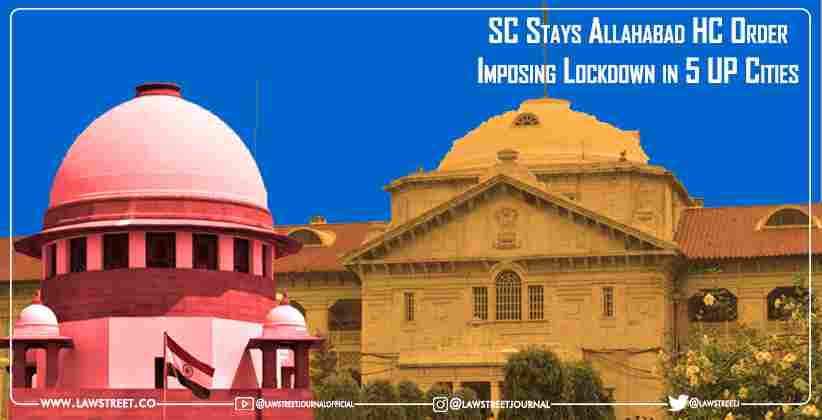In light of the COVID-19 pandemic, the Supreme Court on Tuesday ( April 20, 2021) stayed an Allahabad High Court decision ordering the Uttar Pradesh government to enforce a lockdown in five cities: Prayagraj, Lucknow, Kanpur, Varanasi, and Gorakhpur until (April 26, 2021).
After hearing the claims of Solicitor General Tushar Mehta, a bench led by Chief Justice of India SA Bobde stayed the implementation of the decision.
The Solicitor General had brought the petition before the CJI this morning on an immediate basis, requesting that the case be heard today. The CJI-led bench agreed to hear the SG after the mentioned matters were completed.
The SG, speaking on behalf of the UP government, said that a judicial order imposing a blanket lockdown in five cities would cause enormous administrative difficulties. He assured that the UP government was doing everything possible to keep the COVID-19 situation under control.
While stating that the state had no objections to any of the High Court's orders, the SG said that to lock down five cities by judicial order may not be the right approach".
High Court's directions:
A judgement was passed down in a suo moto PIL by the Allahabad High Court, which slammed the Uttar Pradesh government for failing to make proper preparations for the second wave of the pandemic.
The Uttar Pradesh government, on the other hand, has failed to implement the High Court's order for a lockdown in the five cities. A division bench of the High Court, consisting of Justices Siddhartha Varma and Ajit Kumar, defined the dire state of the state's health-care system and declared that a lockdown was necessary to prevent the situation from spiralling out of control. "Until (the Pandemic) spirals out of control and engulfs the entire population of these hard-hit districts," the bench had said.
"It is a shame that while the Government knew of the magnitude of the second wave it never planned things in advance", said a division bench of Justices Siddhartha Varma and Ajit Kumar in a strongly worded order.
"No concrete plan has yet been chalked out in the light of our observations made in our last order though some efforts, of course, have been made to engage some private hospitals to convert them as Covid hospitals, even their facilities available are not up to mark", it bench added.
The Court detailed the appalling state of the public health care system in Uttar Pradesh's major cities. The Court said that the "medical health system that the government has built in the past, will cater to the needs of less than 0.5 per cent of the city population," referring to hospital figures in Prayagraj. The condition is much worse in cities.
VIP Recommendations needed for tests, hospital admissions:
The order reflected the terrible situation in which VIP recommendations are needed for COVID-19 examinations, remedesivir injections, and hospital beds, among other things.
Only VVIPs are getting reports within 6-12hours, it said.
The Court stated that "it cannot overlook the fact that a significant number of doctors at King George Hospital and other hospitals, such as Swaroop Rani Nehru Medical Hospital, have been placed in isolation after testing positive for Covid."
According to the Court, even Chief Minister Yogi Adityanath has gone into isolation.
Court records displeasure at the conduct of local body elections:
The Court also expressed deep disappointment with the way the government and the State Election Commission handled the election, which included requiring teachers and other government employees to conduct duties that put them at risk of a pandemic.
"The police was virtually shifted to polling places giving priority to election above public health", it lamented while stating, "Further the photographs of the various places where elections were held definitely show that no social distancing was maintained. Also, we find that on many occasions in various political rallies masks were never worn by people."
The court ordered that the organisers of rallies where participants were not wearing masks be punished under the Uttar Pradesh Epidemic Diseases Act and other related laws. On the next hearing date, the Court must be notified of the action taken.
Many doctors and other medical personnel became infected, and the others were overburdened, according to the Court.
"The whole infrastructure would fail, and help would be limited to VIPs and VVIPs," it said.
"If people are restricted from leaving their homes for a week in the first place, the current chain of COVID infection will be disrupted, and this would also provide some relief to frontline medical and health staff, who will focus on certain patients that have already been admitted, the Court had ordered.






